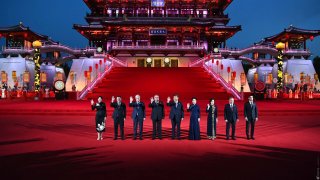Beijing’s Return to Grandeur Will Not Be a Smooth Ride
Global influence is the natural extension of domestic strength. There are warning bells ringing for China too.
When the five Central Asian presidents appeared before President Xi Jinping at the first China-Central Asia Summit, one suspects that Xi would not need to consider his “dear friend” Vladimir Putin anymore. With the Russian army bogged down in its invasion of Ukraine, which has been going on for well more than eighteen months, Beijing has taken initiatives to fill in the power vacuum in the post-Soviet region. This summit is just one of China’s geopolitical moves.
Indeed, China and Russia are no longer the China and Russia of a few years ago. Previously, Beijing still needed to pay lip service to Moscow by connecting its massive cash cow Belt and Road Initiative with the Russia-led but financially poor Eurasian Economic Union in Central Asia. This was somewhat moot since any major agreements between China and Central Asian countries have mostly been happening on a bilateral basis anyway. But nowadays, Beijing doesn’t even need to pretend it cares about Russia’s traditional influence in its backyard.
Consider that the port city of Vladivostok, formerly part of the Qing dynasty Chinese Empire, was recently allowed by Kremlin to be used as a transit port for Chinese domestic trade, thus making it a Chinese port (kind of) for the second time. The city has long symbolized China’s century of humiliation, as its name directly translates as “control the East.”
Beijing knows how to massage the sentiments and feelings of its own people. When the grandiose Tang dynasty-style ceremony was performed at the summit, the re-emergence of China’s glorious history echoes the Chinese people’s national pride. The message being telegraphed is that China has restored its historical position, at least in the eye of the domestic public, which directly targets the party’s ultimate goal: the rejuvenation of the Chinese nation. As economist Branko Milanovic posited, “being active internationally is a matter of domestic political survival and arises because of potential domestic weakness.” After all, for any and all political entities, their continuing existence is always and naturally of the utmost priority.
However, Beijing’s return to historical grandeur will not be so smooth. Putting aside the fact that Europe is moving in a similar direction as the United States in hardening its stance against China, as shown at the recent G7 meeting, changing Sino-Russian relations, which have increasingly favored China, may not be dealt with as easily as Beijing expects. Sino-Russian expert Alexander Lukin has noted that China and Russia “were historically great and independent centers of power and should not tolerate hegemonic dictate of a foreign power.” This tenet includes each other. In the long run, it may be fundamentally unacceptable to the Russian psyche and domestic nationalist sentiment if Russia were to be subjugated as the junior partner in the alliance with China.
Russia’s fear of China’s demographic expansion in the Far East is yet another issue, although research before the Ukraine invasion has largely demonstrated it is presently just a myth. Nonetheless, as Europe shuts its door on Russia’s western side and other Asian powers also unwillingly engage, China’s economic support could play a leading role in facilitating the prosperity of Russia’s eastern border areas. It is possible that if ethnic Han Chinese grow in influence in the Far East, Putin might have to consider finding ways of tightening control over there.
This may also be the fundamental, albeit concealed, reason why Kazakhstan relocated its capital from Almaty to Astana—many ethnic Russians live in northern Kazakhstan, where Astana is located, while Almaty closely borders China’s sparsely populated Xinjiang area. Ironically, Putin employed ethnic Russians to hold referendums as an excuse to invade Ukraine. In the future, the Kremlin may be alert to similar tactics from China on its own land.
That said, global influence is the natural extension of domestic strength. There are warning bells ringing for China too. Confidence in the Chinese economy from within and outside China is faltering. In addition to the country’s widely reported population decline, the unemployment rate of Chinese people aged between sixteen and twenty-four rose to 20.4 percent this April, which is much higher than in the pre-coronavirus period. As Ruchir Sharma, chairman of Rockefeller International, bluntly pointed out: “something is rotten in the Chinese economy.” Without the underpinning of economic vigor, China’s expanding external power may not be sustainable in the long term.
Dr. Jon Yuan Jiang is an independent scholar, and Mandarin and Russian speaker. He has published over seventy articles in media, think tanks, and academic journals such as South China Morning Post, The Diplomat, Lowy Institute, The Jamestown Foundation, The Canberra Times, Media International Australia, and Area Development and Policy.
Image: Photo courtesy of the Office of the President of Kazakhstan.

